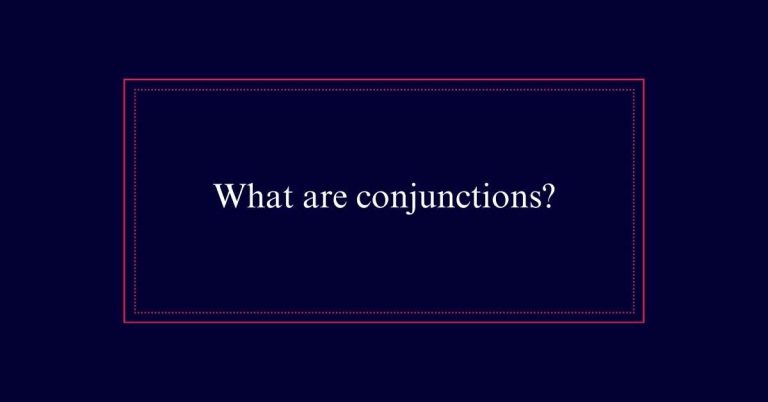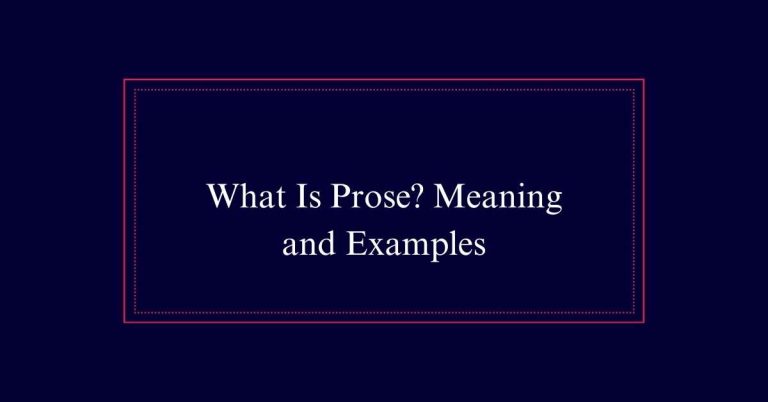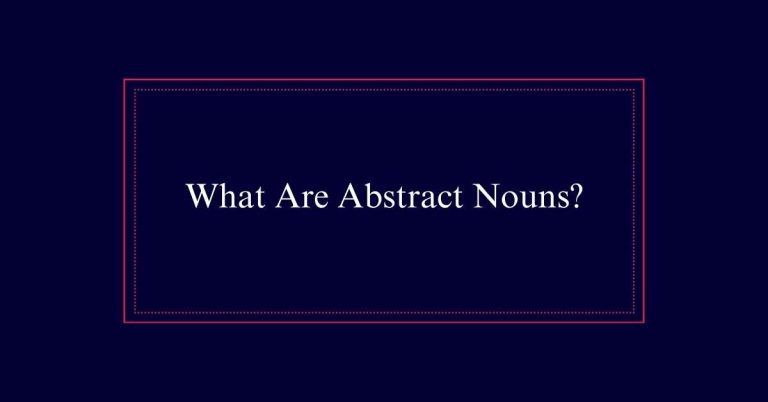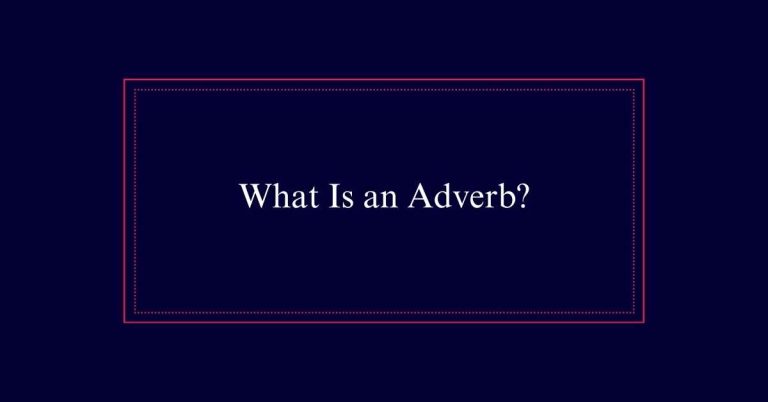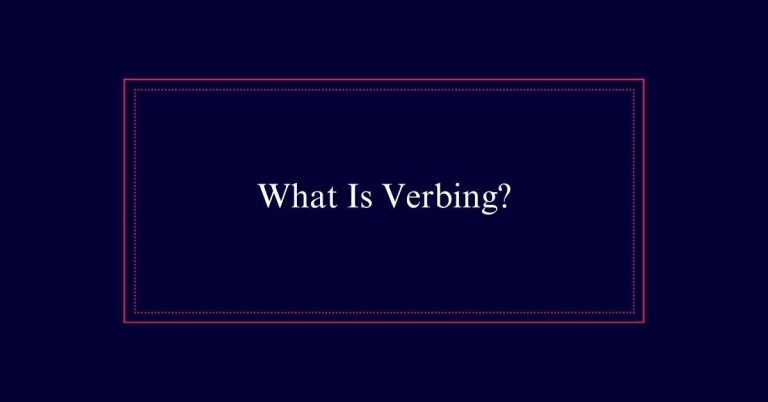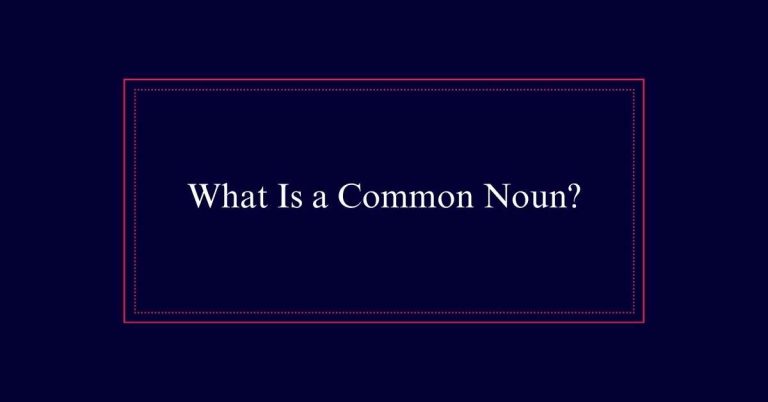How to Use Indefinite Pronouns?
Indefinite pronouns refer to nonspecific individuals, things, or amounts. Examples include ‘everyone’, ‘something’, and ‘anybody’. They can act as subjects, objects, or complements in sentences. Singular pronouns like ‘everyone’ require singular verbs, while plural pronouns like ‘many’ need plural verbs.
Some pronouns, such as ‘all’ and ‘none’, can be singular or plural depending on context. Proper usage avoids repetition and maintains clarity. Additionally, make sure modifiers and verbs agree with the pronoun in number and gender.
What Are Indefinite Pronouns?
Indefinite pronouns are words that refer to nonspecific people, objects, or amounts, making them essential for expressing general ideas. They help convey broad concepts without the need for precise identification.
For instance, words like ‘someone,’ ‘anything,’ and ‘everything’ allow speakers to discuss generalities. These pronouns typically stand alone and do not specify a particular entity. They are versatile and can be used in various contexts, whether referring to people, objects, or quantities.
Indefinite pronouns can be singular, plural, or even flexible in number, depending on how they are used in a sentence.
Common Indefinite Pronouns
Many common pronouns are used to refer to unspecified people, objects, or quantities. These pronouns help convey information without needing to specify exact details. They are versatile and can be used in various contexts.
Some of the most frequently used indefinite pronouns include:
- Someone: Refers to an unspecified person.
- Anything: Refers to an unspecified object or thing.
- Several: Refers to an unspecified quantity, typically more than a few but not many.
These pronouns simplify communication by providing a way to reference general, non-specific entities. They are essential in both written and spoken language, allowing for efficient and clear expression without unnecessary detail.
Types of Indefinite Pronouns
There are six main types of indefinite pronouns, each serving a unique function in communication.
First, some indefinite pronouns refer to all members of a group, such as ‘everyone’ and ‘everything.’
Second, others single out one or more from a group, like ‘anyone’ or ‘anything.’
Third, some convey a broad range of possibilities, such as ‘many’ and ‘several.’
Fourth, certain indefinite pronouns refer to a single unspecified person or thing, like ‘someone’ or ‘something.’
Fifth, others indicate the absence of people or things, such as ‘no one’ and ‘nothing.’
Lastly, some indefinite pronouns refer to general amounts and quantities, like ‘some’ and ‘none.’
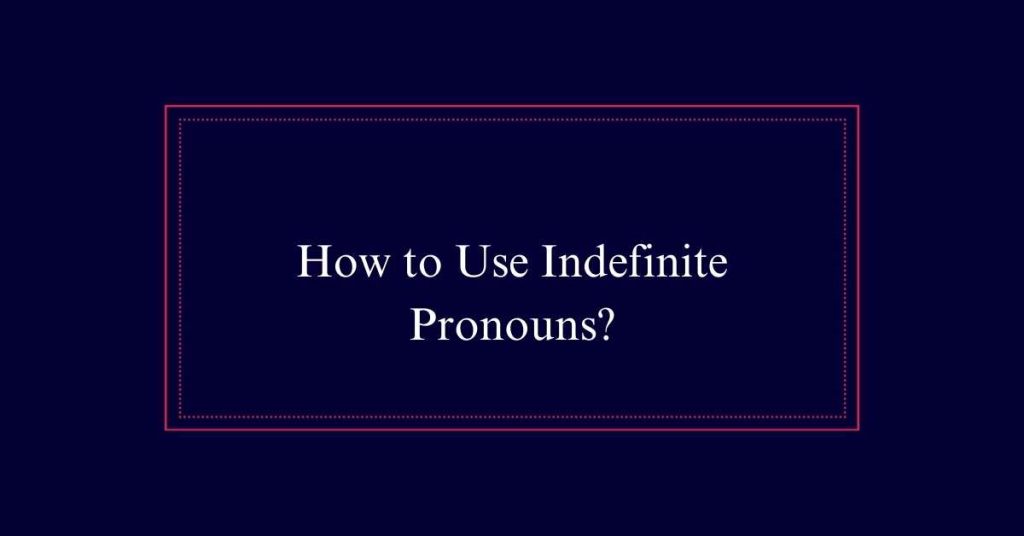
Subject-Verb Agreement
Understanding the types of indefinite pronouns is essential for mastering subject-verb agreement. Indefinite pronouns can be tricky because they do not refer to a specific person or thing. This makes it important to use the correct verb form. Here are some guidelines:
- Singular indefinite pronouns: Words like ‘everyone’ and ‘nobody’ always take a singular verb. For example, ‘Everyone is here.’
- Plural indefinite pronouns: Words like ‘many’ and ‘few’ always take a plural verb. For example, ‘Few are chosen.’
- Context-dependent pronouns: Words like ‘all’ and ‘some’ can be singular or plural based on the noun they refer to. For example, ‘All of the cake is gone‘ versus ‘All of the cakes are gone.
Singular Vs. Plural Pronouns
Singular and plural pronouns differ in how they agree with the verbs and nouns in a sentence. Singular indefinite pronouns include words like ‘everyone,’ ‘somebody,’ and ‘each.’ These pronouns always take singular verbs, such as ‘Everyone is here.’
Plural indefinite pronouns, like ‘many,’ ‘few,’ and ‘several,’ require plural verbs, such as ‘Many are attending.’ Some indefinite pronouns, like ‘all’ and ‘some,’ can be singular or plural based on the context. For instance, ‘All of the cake is gone’ (singular) versus ‘All of the students are present’ (plural).
Subjective and Objective Case
When using indefinite pronouns, it is important to distinguish between the subjective and objective cases to maintain grammatical accuracy.
The subjective case is used when the pronoun acts as the subject of the sentence, while the objective case is used when it functions as the object. For example, in the sentence ‘Everyone wants to succeed,’ ‘everyone’ is the subject. In ‘The teacher gave each a book,’ ‘each’ is the object.
Understanding these cases ensures clear and correct sentence structure.
- Subjective Case Example: ‘Anyone can join the club.’
- Objective Case Example: ‘She invited someone to the party.’
- Mixed Case Example: ‘Someone left their bag, and I found it.’
Negation With Pronouns
In addition to understanding subjective and objective cases, it’s important to know how to use negation with indefinite pronouns properly. When using indefinite pronouns with negation, be mindful of the following rules. Words like “nobody,” “nothing,” and “nowhere” inherently carry a negative meaning and do not require additional negation. For example, “Nobody came” is correct, while “Nobody didn’t come” is incorrect. Using double negatives can confuse the sentence’s meaning. Here’s a quick reference table:
| Indefinite Pronoun | Correct Usage |
|---|---|
| Nobody | Nobody knows. |
| Nothing | Nothing happened. |
| Nowhere | He went nowhere. |
| No one | No one saw it. |
Modifiers and Indefinite Pronouns
Modifiers play an important role in clarifying the meaning of indefinite pronouns in sentences. They provide additional information, making the sentence more precise.
When using modifiers with indefinite pronouns, it is crucial to place them correctly to avoid confusion.
Consider these points:
- Placement: Modifiers should be placed close to the indefinite pronoun they are modifying to maintain clarity.
- Agreement: Make sure that modifiers agree in number and gender with the indefinite pronoun.
- Avoiding ambiguity: Use specific modifiers to avoid vague or ambiguous sentences.
For example, in the sentence ‘Someone important is waiting,’ the modifier ‘important’ clarifies the indefinite pronoun ‘someone.’
Practical Usage in Sentences
Effective use of indefinite pronouns in sentences requires understanding their function and proper placement. Indefinite pronouns, such as ‘someone,’ ‘everything,’ and ‘few,’ refer to non-specific persons or things. They can serve as subjects, objects, or complements in sentences.
For example, ‘Someone left their umbrella’ uses ‘someone’ as the subject. It is important to match the verb with the pronoun’s number. Singular pronouns like ‘everyone’ need singular verbs: ‘Everyone is here.’ Conversely, plural pronouns like ‘many’ need plural verbs: ‘Many are attending.’
Indefinite pronouns can also pair with modifiers to add clarity: ‘Almost everyone agreed.’ Understanding these principles helps ensure proper grammar and clear communication in writing.
Practice Exercises
Let’s enhance our understanding of indefinite pronouns through targeted practice exercises. Engaging in these exercises will help solidify your grasp of how to correctly use indefinite pronouns in various contexts.
Below are some practical activities designed to improve your proficiency:
- Identification Exercise: Read a paragraph and identify all the indefinite pronouns used. Explain their function in each sentence.
- Sentence Formation: Create sentences using a list of indefinite pronouns. Pay attention to subject-verb agreement and correct case usage.
- Error Correction: Review sentences with incorrect indefinite pronoun usage. Identify and correct the errors.
Frequently Asked Questions
How Do Indefinite Pronouns Interact With Possessive Nouns?
Indefinite pronouns require careful handling when interacting with possessive nouns to guarantee subject-verb agreement. For example, ‘Everyone’s book is on the table’ correctly matches the singular indefinite pronoun ‘everyone’ with the possessive form.
How Are Indefinite Pronouns Used in Questions?
Indefinite pronouns are used in questions to refer to nonspecific people or things. For example, “Is anyone coming to the meeting?” or “Did something happen?” They help in asking about undefined subjects or objects.
How Do Indefinite Pronouns Function in Compound Sentences?
Indefinite pronouns in compound sentences function by upholding subject-verb agreement for each clause. They guarantee clarity and coherence when referring to nonspecific entities, aiding in the seamless connection of ideas within the sentence.

